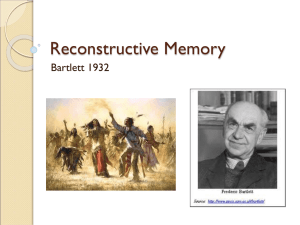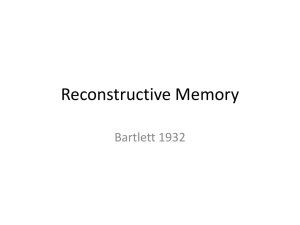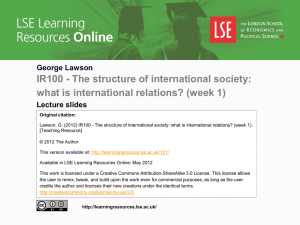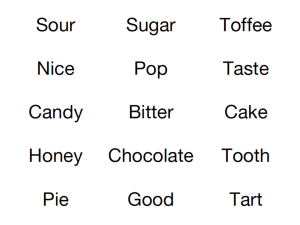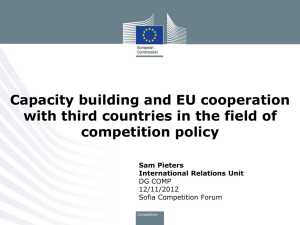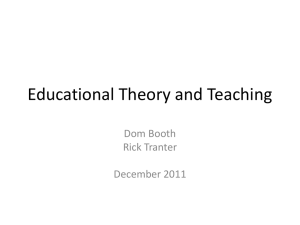Will Bartlett
advertisement
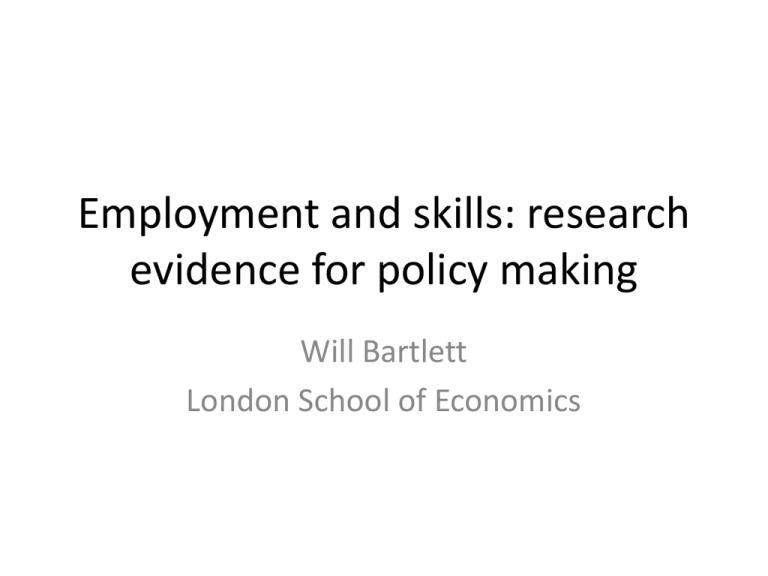
Employment and skills: research evidence for policy making Will Bartlett London School of Economics Outline • • • • • • Impact of economic crisis on labour market New methods to measure skill mismatch Policy process Evidence-based policy making (EBPM) Conclusions Forthcoming book (LSEE research network) 7/11/12 Will Bartlett, LSEE 1 Developments in the enlargement countries • Enlargement countries severely affected by economic crisis • Collapse of external financial inflows • Rising unemployment • Need for new growth model based on improved competitiveness and labour skills • Need, therefore, for better and more effective policy making 13/04/2015 Will Bartlett, European Institute, LSE 2 Unemployment rate (LFS, 2009-11) Slovenia 8.2 EU-27 9.7 Croatia 13.5 Greece 2009 17.7 2011 Spain 21.7 Serbia 23.7 Bosnia 27.6 0 7/11/12 5 10 15 Will Bartlett, LSEE 20 25 30 3 Increase in unemployment rate, 200911 100% 90% 86.3% 80% 70% 60% 48.4% 50% 39.0% 40% 33.1% 30% 29.0% 20.6% 20% 7.8% 10% 0% Greece 7/11/12 Croatia Slovenia Serbia Will Bartlett, LSEE Bosnia Spain EU-27 4 Unemployment rate, Serbia, 2001-11 30 26.2 25 22.9 24.7 23.7 21.0 20 20.2 17.8 15.8 15 14.5 15.8 15.2 10 5 0 2001 2002 2003 2004 2005 2006 2007 2008 2009 2010 2011 7/11/12 Will Bartlett, LSEE 5 New methods to measure skill mismatch • Will Bartlett, Jens Johansen, Debora Gatelli, part of ETF ‘Match’ project • Various indicators of skill mismatch: – Coefficient of variation – Variance of unemployment rate – Proportional measure of mismatch – Occupational measure - kurtosis – Beveridge curve analysis – Wage differentials across education levels 7/11/12 Will Bartlett, LSEE 6 Skill mismatch: coefficient of variation 2.5 2.0 1.5 Serbia Croatia 1.0 0.5 0.0 2005 7/11/12 2006 2007 Will Bartlett, LSEE 2008 2009 7 Skill mismatch by education level: Croatia (2005-10) (proportions) 1.4 1.2 1.0 0.8 Total 0.6 Male Female 0.4 0.2 0.0 ISCED 1 7/11/12 ISCED 2 ISCED 3 Will Bartlett, LSEE ISCED 5 8 Skill mismatch by education level: Montenegro (2007-10)(proportions) 2.5 2.0 1.5 Total Male 1.0 Female 0.5 0.0 Primary school 7/11/12 Vocational education Secondary education Will Bartlett, LSEE University 9 Skill mismatch by education level: Serbia(2007-10)(proportions) 1.4 1.2 1.0 0.8 Total 0.6 Male Female 0.4 0.2 0.0 Low 7/11/12 Medium Will Bartlett, LSEE High 10 Lifelong Learning (% adult population) 18 16 15.9 14 12 10.1 10 8 6 3.4 4 2.3 2 1.6 1.2 Romania Bulgaria 0 Slovenia 7/11/12 EU15 Macedonia Croatia Will Bartlett, LSEE 11 Policy conclusions 1) reform the secondary and vocational education systems 2) improve the labour market matching for women workers through provision of publicly provided nursery and kindergarten education for young children 3) give special encouragement to employers to take on younger skilled workers through job subsidies and internships 4) encourage transfer of skills from foreign owned companies to small domestic firms 5) Encourage employers to provide in-house training (LLL) 6) provide of improved skill forecasts to professionals in career and education guidance for adults as well as school leavers 7/11/12 Will Bartlett, LSEE 12 Evidence Based Policy Making • Are studies such as this useful to policy makers? • Do policy makers make use of research evidence? • What are the drivers of policy making? • Are single studies reliable? • How can research studies be adapted to the needs of policy makers? 7/11/12 Will Bartlett, LSEE 13 Policy process in ‘EU enlargement’ countries • Policy process may differ from developed countries – Close links between politicians and business elite • state capture – Lack of permanent civil service to transmit policy lessons – Poor functioning of social councils – Little engagement of NGOs – Advocacy coalitions 13/04/2015 Will Bartlett, European Institute, LSE 14 Policy transfer • Governments often draw lessons from other countries • What are the causes of policy failure? – Inappropriate conditionality – Inappropriate emulation – misaligned objectives between different actors • Example: lifelong learning policies and EQL adoption (Alexander Kleibrink study) 13/04/2015 Will Bartlett, European Institute, LSE 15 Evidence-based Policy Making (EBPM) • Modern use of term originates in evidencebased medicine – extended to health policy • UK Labour government 1997 announced modernisation of government based on EBPM • Focus on “what works” irrespective of ideology 13/04/2015 Will Bartlett, European Institute, LSE 16 Systematic reviews • Systematic review as a method for EBPM • Policy makers lack time to assess the evidence • Individual studies insufficient to make informed policy decisions • Synthesis of several studies is needed • Use well defined transparent procedures to minimise bias 13/04/2015 Will Bartlett, European Institute, LSE 17 Learning about systematic review • EPPI Centre - An Institute of Education centre focusing on systematic reviews in education, health and social policy. • Campbell Collaboration - Independent organisation producing systematic reviews on what works for education, health and social policy to build healthy and stable societies. • Cochrane Collaboration - Independent organisations producing systematic reviews for health interventions. • Collaboration for Environmental Evidence - Independent organisation producing systematic reviews for environmental management. • International Initiative for Impact Evaluation (3ie) 13/04/2015 Will Bartlett, European Institute, LSE 18 Policy evaluation and pilot projects • Evaluation of policies after they have been implemented • Pilot programmes to test effectiveness • These several problems: – Too long time for effects to be revealed; policy may be changed in meantime – Simultaneous effects of several pilots in action areas may confound results – Hawthorn effects of ‘pioneering spirit’ of pilots 13/04/2015 Will Bartlett, European Institute, LSE 19 Policy evaluation - alternatives • Long-term evaluation of existing programmes – Best value regime for local government in UK • Difference-in-difference method – Identify ‘treatment group’ versus ‘non-treatment group’ • Calculate differential response of different groups to policy treatment (policy intervention) – Early tracking (Hanushek & Woessman, 2006) – Selective schooling (Bonhomme & Sauder, 2011) – Beautiful Serbia ALMP policy (Bonin & Rinne, 2006) 13/04/2015 Will Bartlett, European Institute, LSE 20 Conclusions • Economic crisis emphasises need for EBPM for skills policy • Evidence-based policy widely promoted in developed countries – Systematic reviews – Evaluation studies – But subject to critique • Policy process in transition countries creates obstacles to use of EBPM • Way forward: – Encourage use of systematic review – Difference in difference analyses of specific policies – But be aware of advocacy coalitions and state capture issues 13/04/2015 Will Bartlett, European Institute, LSE 21 LSEE Research Network Book: Part I • Chapter 2: Skill mismatch in enlargement and neighbourhood countries – Will Bartlett, Jens Johansen and Debora Gatelli • • Chapter 3: Skill surveys in Serbia: an overview and a case study - Mihail Arandarenko and Galjina Ognjanov • • Chapter 4: Skill needs on the labour market in Macedonia – Jovan Pejkovski • • Chapter 5: Educational origins and occupational destinations? Dissecting the education-job mismatch in school to work transitions in Croatia - Teo Matković 7/11/12 Will Bartlett, LSEE 22 LSEE Research Network Book: Part II • Chapter 6: Lifelong learning policies in Southeastern Europe: from emulation of EU policies to tailor-made reforms? - Alexander Kleibrink • • Chapter 7: Is government effective in promoting human capital? The case of Macedonia - Maja Nestorovska and Nikica MojsoskaBlazevski • • Chapter 8: Skills matching in Croatian SME sector and competencebased education and training: progress and prospects - Nevenka Čučković and Will Bartlett • • Chapter 9: Reversing the Bosnian “brain drain”: opportunities and challenges – Sasha Barnes and Nermin Oruc 7/11/12 Will Bartlett, LSEE 23 Thank you for your attention!!! 7/11/12 Will Bartlett, LSEE 24
